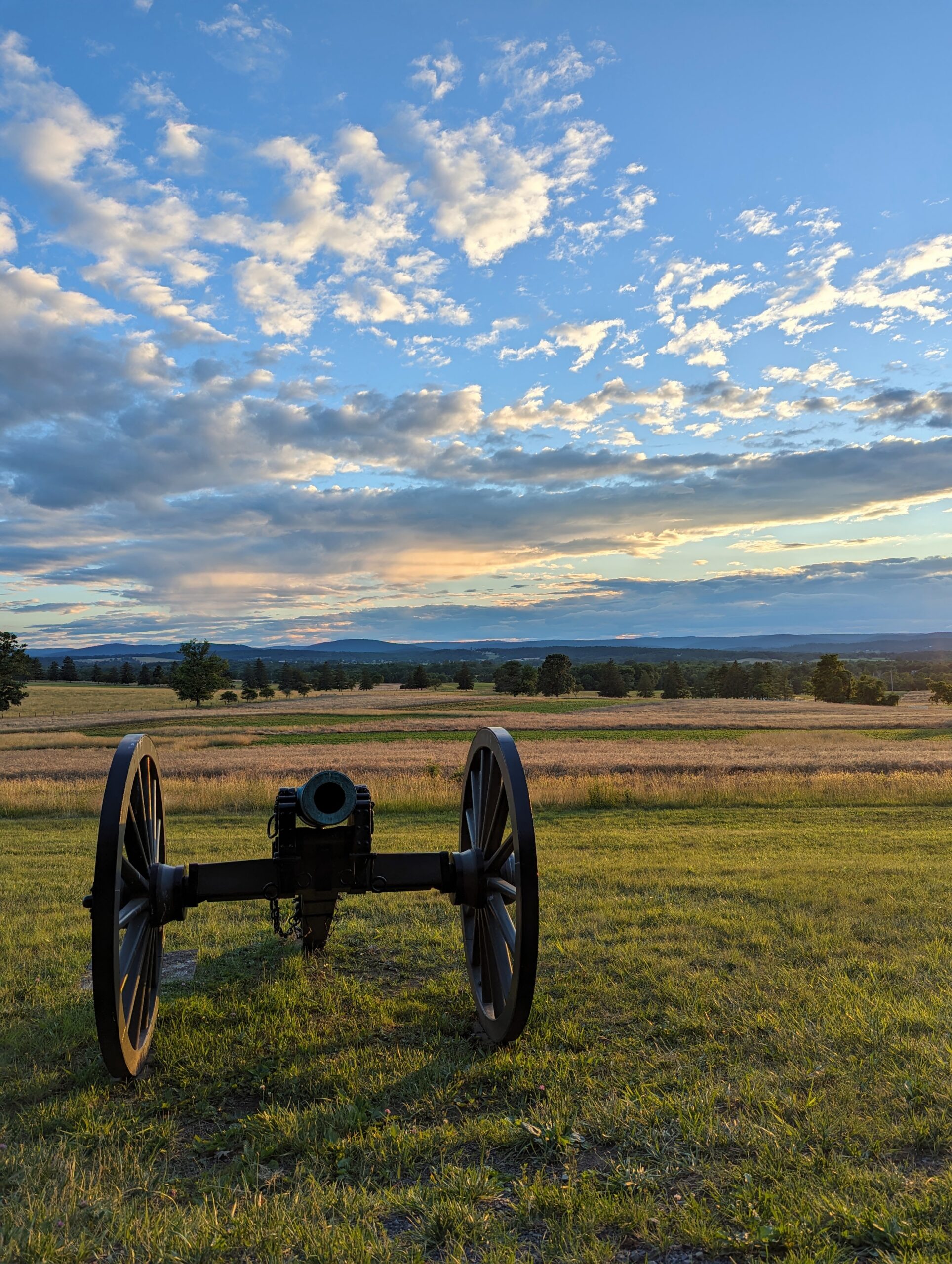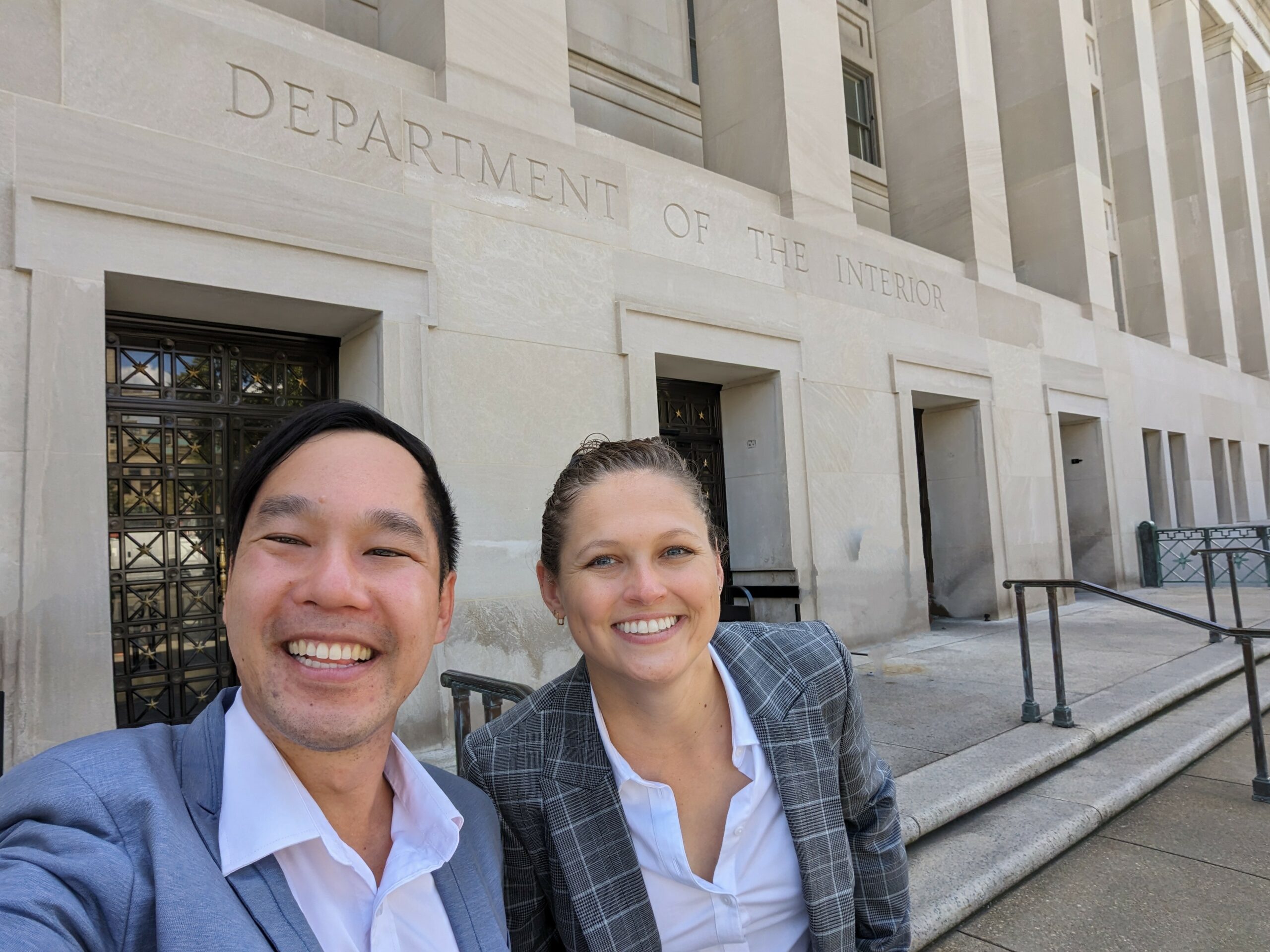Meredith Randolph is a second year MPP student at the University of Virginia’s Frank Batten School of Leadership and Public Policy. As a summer consultant for the National Parks Business Plan Internship (BPI), Meredith worked to ensure the sustainability of the public-private partnership between Gettysburg National Military Park and the Gettysburg Foundation (GF) to reduce barriers to visitation, improve visitor experience, and promote the partnership’s shared goals.
Meredith joined us at the end of the summer to reflect on her BPI experience.
Tell us about your experience at orientation. What were your main takeaways?
The week was awesome. For our cohort, it was a week in the Grand Canyon, so I was going in with high expectations. Starting from the interview process and then onboarding and throughout the orientation week, I was consistently impressed with the Purposeful Growth Institute (PGI) and the NPS Business Management Group’s (BMG) organization, communication, and expectation setting, so that sense of structure really set the tone.
I thought that the balance of training material was exceptionally well done. From a general overview of the NPS to technical consulting tips to relationship management tips, I left training feeling like I was headed into the summer prepared with what I needed to succeed. And it was super fun! The group was welcoming and it was so cool to engage with folks in different disciplines, from all over the country, and from super diverse backgrounds.

What did a “typical” week in your life look like during the BPI?
That’s definitely an impossible question! In the first half of the summer, we were primarily researching and gathering data, so a typical week included interviews with staff, combing through data files, and really understanding the dynamics on the ground. The second half of the summer was focused on deliverables, so we had more of that “head down” analytic time to develop alternatives and build a financial modeling tool, while also staying in touch with the various stakeholders.
Outside of work, a typical week in Gettysburg was about as zen as it gets. There were nightly walks to the nearest observation tower, visits to the local beaver dam, watching sunsets, running and biking through the park’s avenues, and sampling lots of ice cream in downtown Gettysburg.
What are the most valuable skills you gained or honed?
There were several! One huge learning opportunity was working with my co-consultant, Jonny. Coming from very different professional backgrounds, we had very different approaches on how to accomplish things. I learned alot from seeing how his mind works and how his experience in the tech sector informs the way he frames problems and goes about tackling them.
I also learned alot from the way that we did the work. The first part of the summer required a more intensive qualitative data-gathering and synthesis process than I had experience with previously, so I really grew from that effort to gather information and understand our problem. I think that my technical skills improved a lot as well. Coming into the summer with a consulting background, I felt pretty comfortable with the Excel work that our project would require, but the modeling tool we produced for the park was, by far, the most intensive analytical tool that I had ever built, so that allowed me to take some of those more technical skills to the next level.
Finally, I think the BPI developed me as a consultant. My background was more in subject matter consulting, so I had the same clients for all four years that I worked for the firm. Getting the experience this summer of going from problem statement to ideation to final deliverables and recommendations in ten weeks was really valuable and I appreciated getting to experience the life cycle of a project in a really fast-paced environment.
How do you feel about the product you delivered?
I think we knew going in that our project was particularly complex and multi-faceted, including an element of relationship management alongside a really expansive financial and operational challenge. But as we went throughout the summer, and uncovered more and more layers, we got to a point when we realized, there is an infinite number of options to consider and only a finite amount of time, so I feel really proud of the way that we were able to kind of synthesize all of the information into a really well-functioning modeling workbook that would allow the park to explore those other options and combinations long after we’d gone. In framing our recommendations to the park, we were able to add long-term value through structured thinking and analysis that would guide their future decision-making, which I think was extremely beneficial and valuable to the park leadership.

Having the opportunity to then present those recommendations to regional and national leadership was rewarding, both for high-level visibility and exposure, but also because our work was really well-received, which was validating. By working to unravel the data for our project, we were able to reveal considerations that should be accounted for in future decision-making by regional and Washington-level leaders, which I think was a huge value add. Knowing that the work we did was able to factor into those more strategic, higher-level conversations and planning processes going forward was really exciting and getting to interact with those different levels of leadership only made me more interested in coming back to join the Park Service.
How did your internship experience influence your career path?
I think I came into the summer a “solid neutral” on considering the Park Service for future employment, but my experience over the summer left me leaning towards wanting to seriously consider opportunities there. It was really enlightening to learn about more functionally strategic and consultative divisions at the regional and Washington levels, so I’m excited to continue exploring those roles as I look ahead.
I’d say that I feel lighter coming out of this summer in terms of thinking about my career trajectory. For context, I have historically considered myself on a national security/diplomacy career path, while things like environmental stewardship and the role of the Park Service were more just my passion areas. After the BPI, I feel really excited by opportunities that align my passions with the technical things that I’m looking for in a career. I can do the consulting work that I enjoy and make strategic decisions that have impact, while also being able to travel to national parks, be in the outdoors, and enjoy better mental health.
If you were to give any advice to other graduate students, and maybe particularly to policy students who are interested in or considering this experience, what would you have them factor into their thinking?
When weighing this opportunity against others, it’s important to ask yourself what your goals are. Are you taking an internship just to be on a recruitment list or get a return offer? Or do you want to do really valuable substantive work and learn a lot? I think the first can be very unfulfilling and unsatisfying, whereas I’m coming back from my summer on a high.
Another consideration that I would give, particularly to policy students, is not to be intimidated by the business or consulting nature of the BPI program. There is a lot of room for folks with policy backgrounds to contribute, and PGI and the BMG do a fantastic job of making sure that everyone has the skills that they need to succeed through the summer. I think it’s also a great opportunity for policy students to gain experience in a more business-oriented environment to develop those skills and see some of those things that will absolutely be present in a future role. Even if you’re going to be a policy analyst for a government agency, you will be working with consulting firms and private sector folks, so it’s really valuable to get exposure to that way of thinking and working.
What was the most valuable aspect of being a BPI consultant?
This internship was substantive and made me feel like I was doing real, valuable work. After a few years of work experience, I wasn’t exactly excited about having to go back into an internship modality of work. I’d heard other people groaning about being bored or feeling like they didn’t do anything meaningful even with renowned organizations, so I was hesitant. However, my experience was nothing like those anecdotes, and I feel very proud and confident in what I contributed this summer to an organization as awesome as the NPS. That is a huge takeaway for me.
I also think the social aspect of this program is really unique. The opportunity to come in and meet 17 other elite cross-discipline, cross-sector professional students was so rewarding, and really getting to know one of those by living and working together for 10 weeks is so unique and fun!
—
To learn more about the National Parks Business Plan Internship, please visit the BPI Page.
